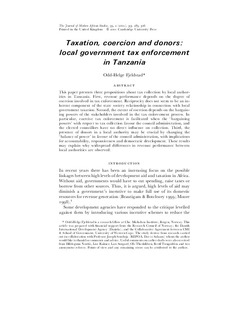| dc.contributor.author | Fjeldstad, Odd-Helge | |
| dc.date.accessioned | 2018-01-04T08:19:30Z | |
| dc.date.available | 2018-01-04T08:19:30Z | |
| dc.date.issued | 2001-01-01 | |
| dc.identifier | oai:www.cmi.no:873 | |
| dc.identifier.citation | in The Journal of Modern African Studies vol. 39 no. 2 pp. 289-306 | |
| dc.identifier.uri | http://hdl.handle.net/11250/2475001 | |
| dc.description.abstract | This paper presents three propositions about tax collection by local authorities in Tanzania. First, revenue performance depends on the degree of coercion involved in tax enforcement. Reciprocity does not seem to be an inherent component of the state-society relationship in connection with local government taxation. Second, the extent of coercion depends on the bargaining powers of the stakeholders involved in the tax enforcement process. In particular, coercive tax enforcement is facilitated when the 'bargaining powers' with respect to tax collection favour the council administration, and the elected councillors have no direct influence on collection. Third, the presence of donors in a local authority may be crucial by changing the 'balance of power' in favour of the council administration, with implications for accountability, responsiveness and democratic development. These results may explain why widespread differences in revenue performance between local authorities are observed. | |
| dc.language.iso | eng | |
| dc.relation | The Journal of Modern African Studies | |
| dc.relation | 2 | |
| dc.relation.ispartof | The Journal of Modern African Studies | |
| dc.relation.ispartofseries | The Journal of Modern African Studies vol. 39 no. 2 | |
| dc.relation.uri | https://www.cmi.no/publications/873-taxation-coercion-and-donors | |
| dc.subject | Tanzania | |
| dc.title | Taxation, coercion and donors. Local government tax enforcement in Tanzania | |
| dc.type | Journal article | |
| dc.type | Peer reviewed | |
